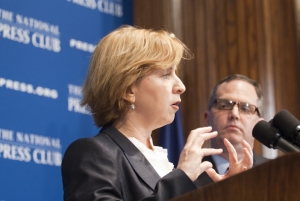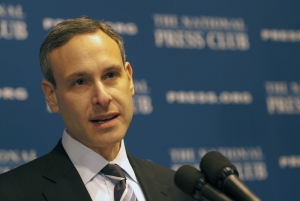The Gulf oil spill hammered a region "nine times the size of Washington, D.C. and the government failed to do its job," New Orleans Mayor Mitch Landrieu told a packed NPC ballroom crowd Aug. 19.
He ripped BP for its failure for three months to cap its well.
"It finally capped the well," he said, "but I have no confidence in its claim that all the oil has gone. This is a defining moment for the country and New Orleans...the U.S. economy is linked to the Gulf."
Moreover, he said, he believes BP "is poised to cut and run."
With more than 24,000 jobs lost from the spill, Landrieu said he will urge President Obama to lift the moratorum on Gulf drilling when Obama travels to New Orleans Aug. 29 for the fifth anniversary of Hurricane Katrina.
But Landrieu said "the future is not about survival but about resurrection...this is the beginning of the beginning."
He cited major strides in rebuilding the city's schools, neighborhoods and health-care system. The city now has more than 87 health clinics, he said, and held up its Columbia Park as a model. "The New Orleans planning is the largest planning effort in U.S. history," Landrieu said.
Landrieu saluted the Justice Departrment for responding to his call for help in reforming the corruption-plagued New Orleans police department. The city has long had one of the nation's highest crime rates.
Landrieu became mayor May 3 after winning 66 percent of the vote and all but one of the 366 precincts. He succeded Ray Nagin.
The former Louisiana lieutenant governor is the brother of Sen. Mary Landrieu, who was at the head table, and son of former New Orlenas Mayor Moon Landrieu, former secretary of the Department of Housing and Urban Development.
Asked whether it makes sense to rebuild a city much of which is below sea level, he was quick to mention Miami, New York and other cities parts of which he said are below sea level.
But in applauding the Army Corps of Engineers' work on his city's fortifications, he said it had not rebuilt the levies to withstand "category four and five storms we know are coming our way." He said storms are getting stronger and more frequent.
With a plea for more federal aid for the city and its region, Landrieu emphasized repeatedly that Gulf seafood is safe. He said the Gulf supplied 30 percent of the nation's seafood. He also said Louisiana supplies the nation with more oil than it gets from Saudi Arabia.
-- Robert Webb, rewebb@aol.com

 "60 Minutes" correspondent Lesley Stahl and the show's executive producer, Jeffrey Fager, talk about "What Makes '60 Minutes' Tick?" on the Nov. 16 edition of "The Kalb Report."
"60 Minutes" correspondent Lesley Stahl and the show's executive producer, Jeffrey Fager, talk about "What Makes '60 Minutes' Tick?" on the Nov. 16 edition of "The Kalb Report."
 HSH Prince Albert II of Monaco, Marquis of Baux, addressed a National Press Club luncheon on November 30, to discuss the environment and climate change. H.S.H. the Prince was in Washington, D.C., for the 50th anniversary of the signing of the Antarctic Treaty on December 1. The son of Prince Rainier III and Princess Grace, H.S.H. the Prince has played a leading role on global environmental issues. At the United Nations he recently called on the international community to take stronger action to curb global warming pollution and to address new industrial threats to protect Arctic ice. The monarch of Monaco is founder of the Prince Albert II of Monaco Foundation, which he set up to protect the environment and encourage sustainable development by responding to three major issues: climate change, biodiversity, and water.
HSH Prince Albert II of Monaco, Marquis of Baux, addressed a National Press Club luncheon on November 30, to discuss the environment and climate change. H.S.H. the Prince was in Washington, D.C., for the 50th anniversary of the signing of the Antarctic Treaty on December 1. The son of Prince Rainier III and Princess Grace, H.S.H. the Prince has played a leading role on global environmental issues. At the United Nations he recently called on the international community to take stronger action to curb global warming pollution and to address new industrial threats to protect Arctic ice. The monarch of Monaco is founder of the Prince Albert II of Monaco Foundation, which he set up to protect the environment and encourage sustainable development by responding to three major issues: climate change, biodiversity, and water.  Jim Leach, the chairman of the National Endowment for the Humanities, and a former U.S. Congressman, speaks at the National Press Club about his agency's work.
Jim Leach, the chairman of the National Endowment for the Humanities, and a former U.S. Congressman, speaks at the National Press Club about his agency's work.


 Former National Press Club President Rick Dunham hosts a roundtable discussion of topics ranging from Obama's first year successes and failures, health care, terrorism, the economy and the 2010 midterm elections. He is joined by Linda Feldmann of The Christian Science Monitor, Todd Gillman of The Dallas Morning News and Steve Thomma of McClatchy Newspapers.
Former National Press Club President Rick Dunham hosts a roundtable discussion of topics ranging from Obama's first year successes and failures, health care, terrorism, the economy and the 2010 midterm elections. He is joined by Linda Feldmann of The Christian Science Monitor, Todd Gillman of The Dallas Morning News and Steve Thomma of McClatchy Newspapers.
 House Majority Leader Steny Hoyer.
House Majority Leader Steny Hoyer.
 Mary Tyler Moore, actress and International Chairman for the Juvenile Diabetes Research Foundation, discussing research and finding a cure for diabetes at a Press Club Luncheon on May 28.
Mary Tyler Moore, actress and International Chairman for the Juvenile Diabetes Research Foundation, discussing research and finding a cure for diabetes at a Press Club Luncheon on May 28.
 Dr. Francis S. Collins, the director of the National Institutes of Health, spoke at a National Press Club luncheon February 26th.
Dr. Francis S. Collins, the director of the National Institutes of Health, spoke at a National Press Club luncheon February 26th. Former Massachusetts Governor and 2008 Presidential Candidate Mitt Romney addressed the National Press Club at a Press Club Luncheon on March 5, 2010. Topics of discussion included the first year of the Obama Administration, the economy, health care, the war on terror, and government spending.
Former Massachusetts Governor and 2008 Presidential Candidate Mitt Romney addressed the National Press Club at a Press Club Luncheon on March 5, 2010. Topics of discussion included the first year of the Obama Administration, the economy, health care, the war on terror, and government spending.
 Haitian Ambassador to the US Raymond Joseph gives his assessment of the recovery efforts in Haiti and the outlook for the country's future at a February 11th Speakers' Press Conference.
Haitian Ambassador to the US Raymond Joseph gives his assessment of the recovery efforts in Haiti and the outlook for the country's future at a February 11th Speakers' Press Conference.



 <!-- @page { margin: 0.79in } P { margin-bottom: 0.08in } -->
<!-- @page { margin: 0.79in } P { margin-bottom: 0.08in } -->




 Commedia del Media is an opportunity for journalists to show their comedic talents. The event supported the National Press Club, the Committee to Protect Journalists and Reporters without Borders.
Commedia del Media is an opportunity for journalists to show their comedic talents. The event supported the National Press Club, the Committee to Protect Journalists and Reporters without Borders.
 A political roundtable hosted by former National Press Club president Rick Dunham examines foreign affairs, the U.S. economy and the upcoming midterm elections. Rick's guests are Thomas Burr, Washington correspondent for the Salt Lake Tribune; Todd Gillman, Washington bureau chief for the Dallas Morning News; and Carolyn Hochhead, Washington correspondent for the San Francisco Chronicle.
A political roundtable hosted by former National Press Club president Rick Dunham examines foreign affairs, the U.S. economy and the upcoming midterm elections. Rick's guests are Thomas Burr, Washington correspondent for the Salt Lake Tribune; Todd Gillman, Washington bureau chief for the Dallas Morning News; and Carolyn Hochhead, Washington correspondent for the San Francisco Chronicle.  As leader of the UN World Food Program since 2007, Josette Sheeran oversees the world's largest humanitarian agency fighting hunger worldwide. At a time of increasing weather-related disasters combined with economic pressures, WFP is feeding more than 100 million people in more than 70 countries, reaching out to hungry people who cannot help themselves, with a special emphasis on women and girls who suffer disproportionately from hunger and malnutrition. Believing that food security is much more than just a humanitarian concern, Ms. Sheeran advocates for both urgent responses and long-term, comprehensive solutions to hunger in support of both agricultural development and national, regional and global stability.
As leader of the UN World Food Program since 2007, Josette Sheeran oversees the world's largest humanitarian agency fighting hunger worldwide. At a time of increasing weather-related disasters combined with economic pressures, WFP is feeding more than 100 million people in more than 70 countries, reaching out to hungry people who cannot help themselves, with a special emphasis on women and girls who suffer disproportionately from hunger and malnutrition. Believing that food security is much more than just a humanitarian concern, Ms. Sheeran advocates for both urgent responses and long-term, comprehensive solutions to hunger in support of both agricultural development and national, regional and global stability.



 Former Minnesota Governor Tim Pawlenty Pawlenty launched his book tour for his memoir, Courage to Stand. In his book, Pawlenty tells his story of going from blue-collar South St. Paul to the governor's mansion, about his time as governor, and shares his ideas for the direction of the country and how some of the things he's done in Minnesota might translate nationally.
Former Minnesota Governor Tim Pawlenty Pawlenty launched his book tour for his memoir, Courage to Stand. In his book, Pawlenty tells his story of going from blue-collar South St. Paul to the governor's mansion, about his time as governor, and shares his ideas for the direction of the country and how some of the things he's done in Minnesota might translate nationally.
 Swearing in by Hon. Hilda Solis, US Secretary of Labor; Hollywood Producer/Director Chuck Bowman; CBS News veteran Bill Kurtis, Mark Hamrick and more, from the National Press Club.
Swearing in by Hon. Hilda Solis, US Secretary of Labor; Hollywood Producer/Director Chuck Bowman; CBS News veteran Bill Kurtis, Mark Hamrick and more, from the National Press Club.



 Pickens, the legendary Texas oil man elaborated on the need for cleaner fuel to save our country. Sharing the dais, his fellow billionaire and largest US land owner Ted Turner agreed with Pickens and added his own concern. April 19, 2011
Pickens, the legendary Texas oil man elaborated on the need for cleaner fuel to save our country. Sharing the dais, his fellow billionaire and largest US land owner Ted Turner agreed with Pickens and added his own concern. April 19, 2011
 Political commentator and Fox News Contributor Juan Williams, who was fired by NPR in October after making controversial comments about Muslims, addresses a National Press Club luncheon on Thursday, May 26. Williams has voiced support for current GOP efforts to strip his former employer of its federal funding.
Political commentator and Fox News Contributor Juan Williams, who was fired by NPR in October after making controversial comments about Muslims, addresses a National Press Club luncheon on Thursday, May 26. Williams has voiced support for current GOP efforts to strip his former employer of its federal funding.
 Nuclear Regulatory Commission Chairman Gregory Jaczko speaks at a National Press Club luncheon, July 18th, 2011. Jaczko told the National Press Club luncheon audience that his agency should act within 90 days on regulatory changes recommended in response to Japan's nuclear power disaster.
Nuclear Regulatory Commission Chairman Gregory Jaczko speaks at a National Press Club luncheon, July 18th, 2011. Jaczko told the National Press Club luncheon audience that his agency should act within 90 days on regulatory changes recommended in response to Japan's nuclear power disaster. Transportation Secretary Ray LaHood discussed the Jobs Bill, distracted driving and other transportation issues at a National Press Club luncheon on Thursday, Oct. 13.
Transportation Secretary Ray LaHood discussed the Jobs Bill, distracted driving and other transportation issues at a National Press Club luncheon on Thursday, Oct. 13.